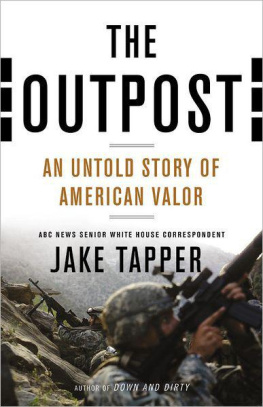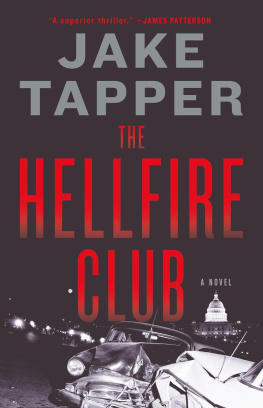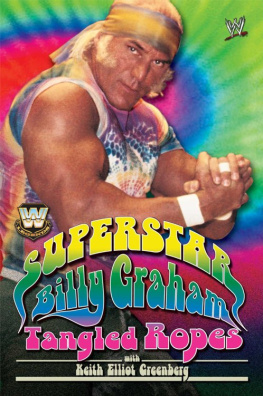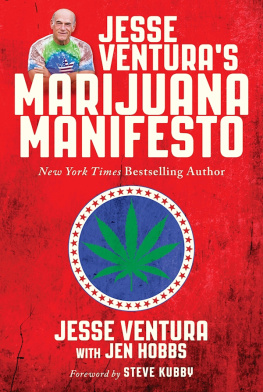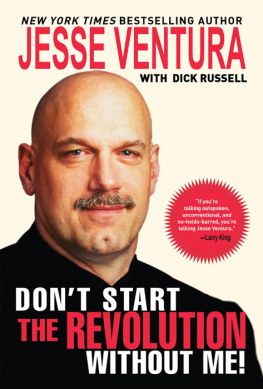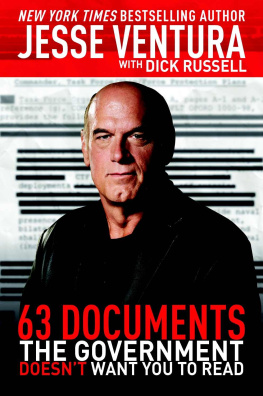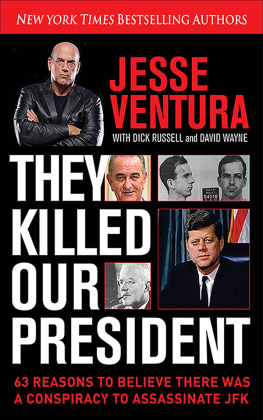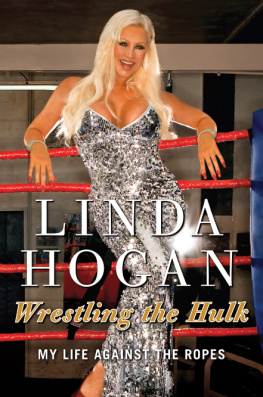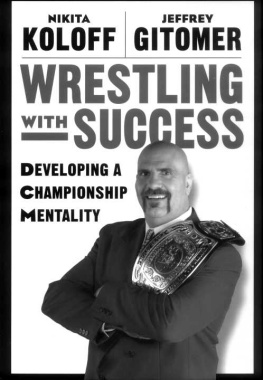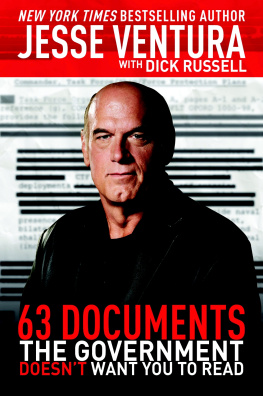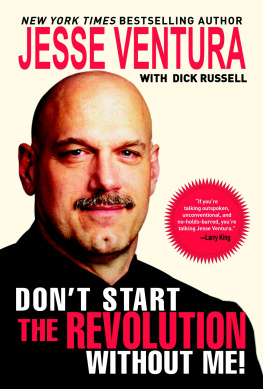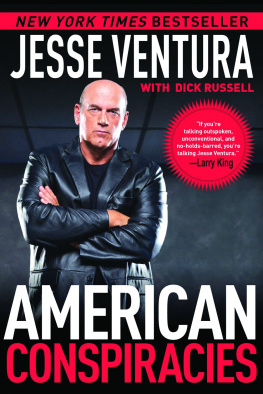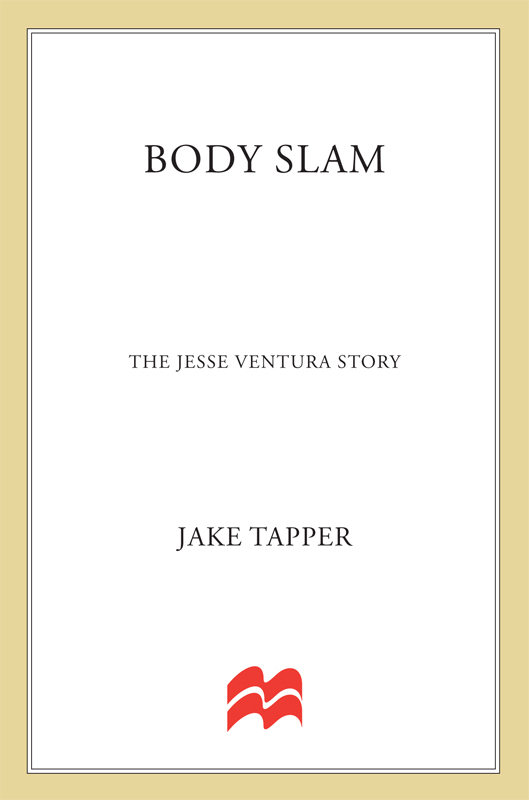Contents
Guide

The author and publisher have provided this e-book to you for your personal use only. You may not make this e-book publicly available in any way. Copyright infringement is against the law. If you believe the copy of this e-book you are reading infringes on the authors copyright, please notify the publisher at: us.macmillanusa.com/piracy.
Contents
As it had in high school and as a Navy SEAL, his strong-looking physiqueaugmented significantly by his wit and blusterenabled him to grow popular, to get over as they say in pro wrestling parlance. He was well below average as a wrestler, says Meltzer, recalling one particularly uninspired bout Jesse had with Moondog Mayne, a skilled wrestler. That match was pretty bad, Meltzer says. Still, Jesse was one of the better personalities. Taking a page from Superstar Billy Grahams book, Jesse would do his homework on each city, researching the local sports teams and any issue he could use to antagonize the crowd.
On the road, Jesse would try to avoid temptation whenever possible. While his fellow wrestlers would go out drinking after an event, Jesse would keep away from barroom troubles, locking himself in his hotel room, calling Terry every night, and maintaining the discipline hed learned in SEAL training.
He stayed in his hotel room, Sharkey says. And when he was wrestling in Minneapolis, instead of having a beer with the fellas, hed just go straight home. He wanted to be with Terry. A lot of guys in the wrestling business, they go down the toilet, and get involved in drugs and drinking, but he never did.
From BODY SLAM
Acknowledgments
This book could never have come about without the faith, guidance, leadership, and friendship of my agents, Neal Bascomb and Christy Fletcher. I am immeasurably grateful to them for believing in me and working tirelessly on my behalf. I should also sing the praises of Joe Veltre, my editor at St. Martins Press, and his assistant Erika Fad. Joe, in particular, merits some of the credit for this book: the whole thing was kind of his idea.
Writers seldom get to thank people whove helped them throughout the years. As even the most famous writers toil in relative obscurity, we tend not to have stock speeches thanking the Academy filed away. Therefore, Acknowledgment sections of books are handy in expressing our gratefulness to those people who helped us achieve, as modest as those achivements may be. There are a number of individuals whom I need to thank, including David Talbot and Joan Walsh at Salon Magazine; David Carr and Erik Wemple at Washington City Paper; Glenn Frankel, Joel Garreau, Peggy Hackman and Rose Jacobius at the Washington Post; Guy Raz and Ellen Weiss at National Public Radio; Alex Heard at the New York Times; Josh Cohen at George; Maggie Murphy, George Blooston, Doug Brod, and Anna Holmes of Entertainment Weekly; David Eggers of Timothy McSweeneys Internet Tendency acclaim; Ana Marie Cox from Mother Jones; Stacy Mason, Susan Glasser, Craig Winneker, Tim Burger, Lee Horwich and Ed Henry at Roll Call; Bill Thomas and Lynda Robinson at Captial Style; Eliot Kaplan at Philadelphia Magazine; Jay Heindrichs, Jim Collins, and Theresa DOrsi at the Dartmouth Alumni Magazine; Andrew OHehir at Swing; Lance Gould at Spy; Steve Friedman and Lee Smith at GQ; and lastly, the inimitable Joey Anuff of suck.com. A special thanks to Marjorie Margolies-Mezvinsky, Jody Powell, Professors Maury Rapf and John Michael Hayes, Jim and Sarah Brady, and Tony Auth.
Thanks also to: Weiss, Flug, Rake, Daryl, Haber, Scully, Corny, Pace, Barts, Fred, Gabby, Groq, McKenna, Sean, Brett, Caroline, Brad, Feinstein, Amy, Bob, Schrader, Rusty, Brett & Jen, Karp and E.T. Cohen. Im lucky to have a wonderful family, all of whom assuredly know how I feel about them already, but as long as Im listing people Im fond of, I might as well give the names of those I love the most: Grammie and Grampie, the Chang Gang, Shelly, Lisi, Becky, Debby, and Mom and Dad.
And of, course, my brother Aaron, to whom this book is dedicated.
About the research methods
As Governor Ventura signed a six-figure deal with a separate publisher for his autobiography, he refused to cooperate with repeated interview requests. The information contained herein comes from hundreds of hours conducting dozens of interviews with Governor Venturas present and former colleagues, friends, teachers, fellow soldiers, opponents (in both wrestling and politics), and reporters. I thank those individuals for their time. I am indebted to the exemplary reporting by the outstanding Minnesota press corpsparticularly Minnesota Public Radio, the Minneapolis Star Tribune, Brooklyn Park Sun Post, and St. Paul Pioneer Press. I have tried to either reference or footnote those Jesse Ventura quotes which were taken from exclusive interviews.
INTRODUCTION
Tom Brokaw winced.
Here it was, one of the most interesting election nights in recent memorya night where Democrats nationwide were upsetting all pundits predictions, an evening whose abysmal GOP performance would end up felling House Speaker Newt Gingrich, an ephemeral moment of jubilation for the beleaguered President Bill Clintonand yet, in the midst of all this this history, this gravitas the internationally known and respected anchorman found himself talking via satellite to a a a former pro wrestler.
Appearing bemused more than anything else, Brokaw briefed the television public as to the events leading to this ignominious interview: Out in Minnesota that night, November 3, 1998, Reform Party candidate Jesse The Body Ventura, forty-seven, had eked out a plurality victory in a three-way race for governor. Though 63% of the states voting public had pulled levers for other candidates, 37% was good enough for that night, as it had been a three-way race. January, 1999, would bring Governor Jesse The Body Ventura to the state capital in St. Paul.
Brokaws apparent discomfort may have been understandable. This new governor was a man, after all, who had once dressed in oversized sunglasses and a feather boa, taunting opponents named Brutus The Barber Beefcake and George The Animal Steele. He was a man whose Hollywood film career was so, well, so modest, that his last roleArkham Asylum guard in the 1997 dud Batman and Robin garnered him thirty-seventh listing in the credits, and didnt even earn the dignity of a name. A candidate whom First Lady Hillary Clinton had derided as a circus sideshow only days before this was the next governor from the state of statesmen? From the land that begot senators and vice presidents Hubert Humphrey and Walter Mondale, as well as Supreme Court justices Warren Burger and Harry Blackmun? Governor Jesse The Body Ventura?!
He looked funnysix-feet-five, 270 pounds, head shaved to the skull, a Great Santini mustache. He talked funnylike he had a ball of phlegm in the back of his throat that he just couldnt swallow. He had so much energy coursing through his veins, so much unbridled testosterone, he was constantly shaking his head palsylike, fidgeting like a nine-year-old whose Ritalin prescription had run dry. When he tried to use big words or leadership phrases to sound gubernatorialAt this point in time, for instancethe result was often that he sounded like an uneducated man throwing out a phrase hed caught on PBS while channel-surfing to Jerry Springer.
Should we call you Governor Ventura or Governor The Body? Brokaw lamely joked. But Jesse couldnt hear the anchorman above the clamor of his celebration party at the Minneapolis racetrack Canterbury Park. Jesse wedged the earpiece tighter into his ear and asked Brokaw to repeat the question.


